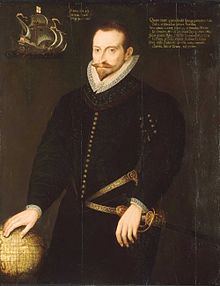James Lancaster

Sir James Lancaster (c. 1554 – 6 June 1618) was an English privateer and trader of the Elizabethan era.
Life and work
Lancaster came from Basingstoke in Hampshire.
Lancaster was brought up in
East India activities
On 10 April 1591 Lancaster started from Torbay in Devon, with George Raymond and Samuel Foxcroft, on his major voyage to the East Indies; this fleet of three ships (Penelope, Marchant Royal and Edward Bonaventure[3]) was the earliest of the English overseas Indian expeditions. They reached Table Bay on 1 August 1591.[4]
Losing one ship off
After a later crossing to
In 1600 he was given command of the
Lancaster continued to be one of the chief directors of the East India Company until his death in June 1618. Most of the voyages of the early Stuart period both to India and in search of the Northwest Passage were undertaken under his sponsorship and direction. In July 1616, Lancaster Sound, the entrance to the Northwest Passage, on the north-west side of Baffin Bay (74° N.), was named by William Baffin after Sir James.
Will
His will (dated 18 April 1618)

Scurvy
At some point in his travels, Lancaster noted the efficacy of fresh fruit as a preventative for scurvy.[8]
In 1601 Lancaster performed an experimental study of the antiscorbutic effects of lemon juice. His fleet of four ships departed Torbay in southwest England on 21 April 1601, and scurvy began appearing in three of the ships by 1 August (4 months after sailing). By the time of arrival, 9 September, at Table Bay in southern Africa, the three ships were so devastated by scurvy that the men of Lancaster's ship, Red Dragon, had to assist the rest of the fleet into the harbor. Lancaster's men remained in better health than the men on the other ships because every morning he gave them three spoonfuls of bottled lemon juice that he had taken to sea. Lancaster would spend much of his time in Madagascar, where he would retrieve more lemon juice, and other citrus to treat his men.[9][10]
The Admiralty received Lancaster's report. In 1795 – nearly 200 years later and after countless, unnecessary deaths – the Admiralty finally mandated lemon juice for all sailors.[11][12]
References
- ^ "Sir James Lancaster, 1554/5-1618 | Royal Museums Greenwich". www.rmg.co.uk.
- ^ "Sir James Lancaster | Explorer, East India Company & Sea Captain | Britannica". www.britannica.com.
- ^ East India Company (1897). List of factory records of the late East India Company : preserved in the Record Department of the India Office, London. p. iv.
- doi:10.1093/ref:odnb/15961. (Subscription or UK public library membershiprequired.)
- ^ Raikes, Charles, The Englishman of India, 1867, London
- ^ a b "210773-4 SIR JAMES LANCASTER FOR POOR SCHOLARS OF OXFORD AND CAMBRIDGE UNIVERSITIES". Central Register of Charities. Charity Commission for England and Wales. 1998. Retrieved 30 September 2008.[permanent dead link]
- ^ Herbert, William (1836). The History of the Twelve Great Livery Companies of London. London: self-published. pp. 361–363.
- S2CID 247619734.
- OCLC 1850893.
- ^ Sharpe, Brandon (23 April 2015). "Selden Map Atlas". Thinkingpast.com. Retrieved 28 April 2015.
- PMID 13515823.
- PMID 19519673. Archived from the original(PDF) on 3 April 2015.
Further reading
- Foster Rhea Dulles, Eastward Ho! The First English Adventurers to the Orient: Richard Chancellor, Anthony Jenkinson, James Lancaster, William Adams, Sir Thomas Roe (John Lane, The Bodley Head, 1931)
External links
- Sir James Lancaster at Encyclopædia Britannica.com
- Ye Olde Booke O' Seadogs: Sir James Lancaster[permanent dead link]
- Sir James Lancaster, a portrait from the National Maritime Museum, London
- Franks, Michael. (2007). The Basingstoke Admiral: a life of Sir James Lancaster.
- Markham, Clements R. (1887) The Voyages of Sir James Lancaster, Kt., to the East Indies. ISBN 978-1-108-01147-1)
